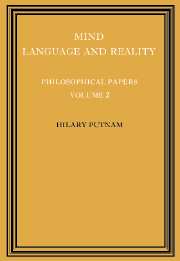Book contents
- Frontmatter
- Contents
- Dedication
- Introduction
- 1 Language and philosophy
- 2 The analytic and the synthetic
- 3 Do true assertions correspond to reality?
- 4 Some issues in the theory of grammar
- 5 The ‘innateness hypothesis’ and explanatory models in linguistics
- 6 How not to talk about meaning
- 7 Review ofThe concept of a person
- 8 Is semantics possible?
- 9 The refutation of conventionalism
- 10 Reply to Gerald Massey
- 11 Explanation and reference
- 12 The meaning of ‘meaning’
- 13 Language and reality
- 14 Philosophy and our mental life
- 15 Dreaming and ‘depth grammar’
- 16 Brains and behavior
- 17 Other minds
- 18 Minds and machines
- 19 Robots: machines or artificially created life?
- 20 The mental life of some machines
- 21 The nature of mental states
- 22 Logical positivism and the philosophy of mind
- Bibliography
- Index
5 - The ‘innateness hypothesis’ and explanatory models in linguistics
Published online by Cambridge University Press: 12 January 2010
- Frontmatter
- Contents
- Dedication
- Introduction
- 1 Language and philosophy
- 2 The analytic and the synthetic
- 3 Do true assertions correspond to reality?
- 4 Some issues in the theory of grammar
- 5 The ‘innateness hypothesis’ and explanatory models in linguistics
- 6 How not to talk about meaning
- 7 Review ofThe concept of a person
- 8 Is semantics possible?
- 9 The refutation of conventionalism
- 10 Reply to Gerald Massey
- 11 Explanation and reference
- 12 The meaning of ‘meaning’
- 13 Language and reality
- 14 Philosophy and our mental life
- 15 Dreaming and ‘depth grammar’
- 16 Brains and behavior
- 17 Other minds
- 18 Minds and machines
- 19 Robots: machines or artificially created life?
- 20 The mental life of some machines
- 21 The nature of mental states
- 22 Logical positivism and the philosophy of mind
- Bibliography
- Index
Summary
The innateness hypothesis
The ‘innateness hypothesis’ (henceforth, the ‘IH’) is a daring – or apparently daring; it may be meaningless, in which case it is not daring – hypothesis proposed by Noam Chomsky. I owe a debt of gratitude to Chomsky for having repeatedly exposed me to the IH; I have relied heavily in what follows on oral communications from him; and I beg his pardon in advance if I mis-state the IH in any detail, or misrepresent any of the arguments for it. In addition to relying upon oral communications from Chomsky, I have also relied upon Chomsky's paper ‘Explanatory models in linguistics’ (Chomsky, 1962), in which the IH plays a considerable role.
To begin, then, the IH is the hypothesis that the human brain is ‘programmed’ at birth in some quite specific and structured aspects of human natural language. The details of this programming are spelled out in some detail in ‘Explanatory models in linguistics’. We should assume that the speaker has ‘built in’ a function which assigns weights to the grammars G1, G2, G3, … in a certain class Σ of transformational grammars. Σ is not the class of all possible transformational grammars; rather all the members of Σ have some quite strong similarities. These similarities appear as ‘linguistic universals’ – i.e. as characteristics of all human natural languages. If intelligent nonterrestrial life – say, Martians – exists, and if the ‘Martians’ speak a language whose grammar does not belong to the subclass Σ of the class of all transformational grammars, then, I have heard Chomsky maintain, humans (except possibly for a few geniuses or linguistic experts) would be unable to learn Martian; a human child brought up by Martians would fail to acquire language; and Martians would, conversely, experience similar difficulties with human tongues.
- Type
- Chapter
- Information
- Philosophical Papers , pp. 107 - 116Publisher: Cambridge University PressPrint publication year: 1975
- 1
- Cited by



